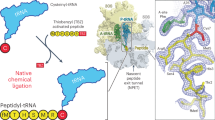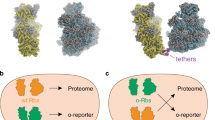Abstract
THE basic peptide antibiotic viomycin inhibits prokaryotic protein biosynthesis1,2, and seems to bind at least to the small ribosomal subunit because it competes partially with the binding of streptomycin3. However, viomycin does not induce misreading like streptomycin1, but promotes association of the ribosomal subunits, stabilises 70S couples4, and blocks trans-location5,6. Interestingly, resistant mutants have been found containing either an altered 30S or an altered 50S subunit7–9. Viomycin strengthens the association of the sensitive subunits but does not affect the association of subunits derived from resistant mutants4. These mutants have been obtained from Mycobacterium smegmatis, which is highly sensitive in culture in contrast to Escherichia coli. We describe here the formation of totally reconstituted subunits using components of sensitive and resistant ribosomes. The reconstituted particles were tested with their complementary, sensitive subunit with respect to viomycin-induced 70S couple formation. The resistance property of either subunit was shown to be located in the RNA moiety.
This is a preview of subscription content, access via your institution
Access options
Subscribe to this journal
Receive 51 print issues and online access
$199.00 per year
only $3.90 per issue
Buy this article
- Purchase on Springer Link
- Instant access to full article PDF
Prices may be subject to local taxes which are calculated during checkout
Similar content being viewed by others
References
Davies, J. E., Gorini, L. & Davis, B. D. Molec. Pharmac. 1, 93–106 (1965).
Tanaka, N. & Igusa, S. J. Antibiot. 21, 239–240 (1968).
Masuda, K. & Yamada, T. Biochim. biophys. Acta 453, 333–339 (1976).
Yamada, T. & Nierhaus, K. H. Molec. gen. Genet. 161, 261–265 (1978).
Lion, Y. F. & Tanaka, N. Biochem. biophys. Res. Commun. 71, 477–483 (1976).
Modolell, J. & Vázquez, D. Eur. J. Biochem. 81, 491–497 (1977).
Yamada, T., Masuda, K., Shoji, K. & Hori, M. J. Bact. 112, 1–6 (1972).
Yamada, T., Masuda, K., Shoji, K. & Hori, M. Antimicrob. Ag. Chemother. 6, 46–53 (1974).
Yamada, T., Masuda, K., Mizugichi, Y. & Suga, K. Antimicrob. Ag. Chemother. 9, 817–823 (1976).
Dohme, F. & Nierhaus, K. H. J. molec. Biol. 107, 585–599 (1976).
Traub, P., Mizushima, S., Lowry, G. V. & Nomura, M. Meth. Enzym. 20C, 391–407 (1971).
Helser, T. L., Davies, J. E. & Dahlberg, J. E. Nature 233, 12–14 (1971); Nature new Biol. 235, 6–9 (1972).
Lai, C. J. & Weisblum, B. Proc. natn. Acad. Sci. U.S.A. 68, 856–860 (1971).
Cundliff, E. Nature 272, 792–795 (1978).
Author information
Authors and Affiliations
Rights and permissions
About this article
Cite this article
YAMADA, T., MIZUGICHI, Y., NIERHAUS, K. et al. Resistance to viomycin conferred by RNA of either ribosomal subunit. Nature 275, 460–461 (1978). https://doi.org/10.1038/275460a0
Received:
Accepted:
Published:
Issue Date:
DOI: https://doi.org/10.1038/275460a0
This article is cited by
-
Discovery and characterization of genes conferring natural resistance to the antituberculosis antibiotic capreomycin
Communications Biology (2023)
-
The structures of the anti-tuberculosis antibiotics viomycin and capreomycin bound to the 70S ribosome
Nature Structural & Molecular Biology (2010)
-
The antibiotic viomycin traps the ribosome in an intermediate state of translocation
Nature Structural & Molecular Biology (2007)
-
Interaction between the ribosomal subunits: 16S rRNA suppressors of the lethal ΔA1916 mutation in the 23S rRNA of Escherichia coli
Molecular Genetics and Genomics (2007)
-
Methylation of 16S ribosomal RNA and resistance to aminoglycoside antibiotics in clones of Streptomyces lividans carrying DNA from Streptomyces tenjimariensis
Molecular and General Genetics MGG (1985)
Comments
By submitting a comment you agree to abide by our Terms and Community Guidelines. If you find something abusive or that does not comply with our terms or guidelines please flag it as inappropriate.



